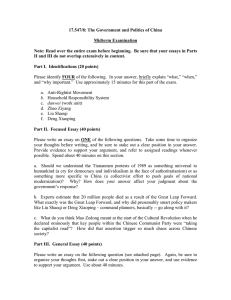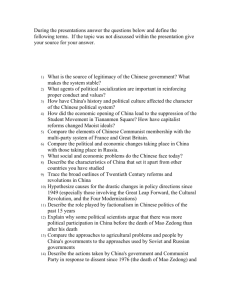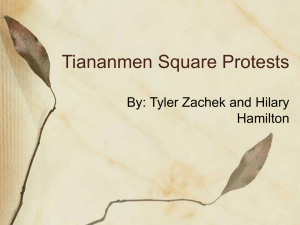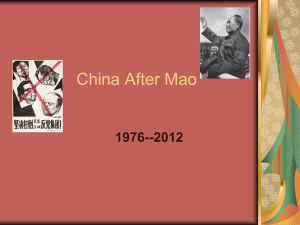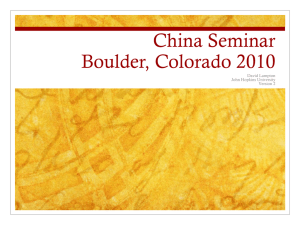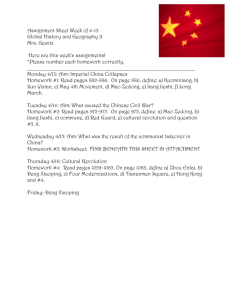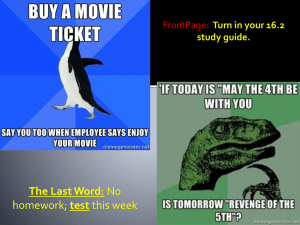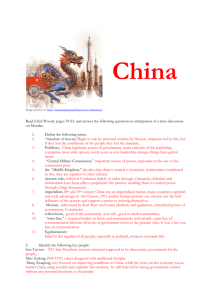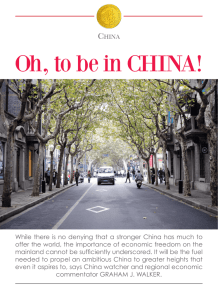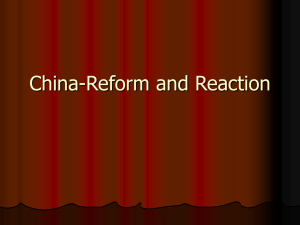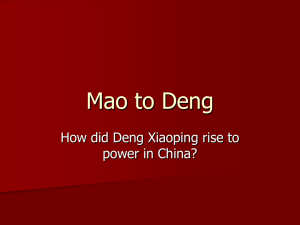UCL 2 CHINA AFTER MAO The article covers the period from the
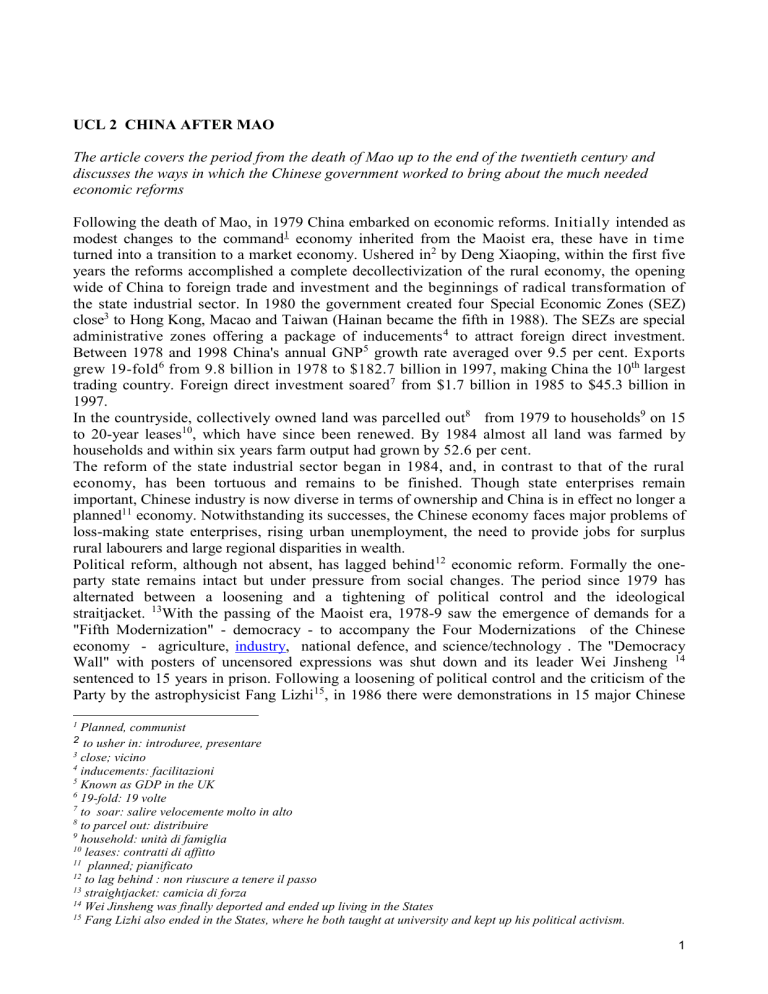
UCL 2 CHINA AFTER MAO
The article covers the period from the death of Mao up to the end of the twentieth century and discusses the ways in which the Chinese government worked to bring about the much needed economic reforms
Following the death of Mao, in 1979 China embarked on economic reforms. Initially intended as modest changes to the command
1
economy inherited from the Maoist era, these have in time turned into a transition to a market economy. Ushered in 2 by Deng Xiaoping, within the first five years the reforms accomplished a complete decollectivization of the rural economy, the opening wide of China to foreign trade and investment and the beginnings of radical transformation of the state industrial sector. In 1980 the government created four Special Economic Zones (SEZ) close
3
to Hong Kong, Macao and Taiwan (Hainan became the fifth in 1988). The SEZs are special administrative zones offering a package of inducements
4
to attract foreign direct investment.
Between 1978 and 1998 China's annual GNP
5
growth rate averaged over 9.5 per cent. Exports grew 19-fold
6
from 9.8 billion in 1978 to $182.7 billion in 1997, making China the 10 th
largest trading country. Foreign direct investment soared
7
from $1.7 billion in 1985 to $45.3 billion in
1997.
In the countryside, collectively owned land was parcelled out 8 from 1979 to households 9 on 15 to 20-year leases
10
, which have since been renewed. By 1984 almost all land was farmed by households and within six years farm output had grown by 52.6 per cent.
The reform of the state industrial sector began in 1984, and, in contrast to that of the rural economy, has been tortuous and remains to be finished. Though state enterprises remain important, Chinese industry is now diverse in terms of ownership and China is in effect no longer a planned
11
economy. Notwithstanding its successes, the Chinese economy faces major problems of loss-making state enterprises, rising urban unemployment, the need to provide jobs for surplus rural labourers and large regional disparities in wealth.
Political reform, although not absent, has lagged behind
12
economic reform. Formally the oneparty state remains intact but under pressure from social changes. The period since 1979 has alternated between a loosening and a tightening of political control and the ideological straitjacket.
13
With the passing of the Maoist era, 1978-9 saw the emergence of demands for a
"Fifth Modernization" - democracy - to accompany the Four Modernizations of the Chinese economy - agriculture, industry , national defence, and science/technology . The "Democracy
Wall" with posters of uncensored expressions was shut down and its leader Wei Jinsheng
14 sentenced to 15 years in prison. Following a loosening of political control and the criticism of the
Party by the astrophysicist Fang Lizhi 15 , in 1986 there were demonstrations in 15 major Chinese
1 Planned, communist
2 to usher in: introduree, presentare
3 close; vicino
4 inducements: facilitazioni
5 Known as GDP in the UK
6 19-fold: 19 volte
7 to soar: salire velocemente molto in alto
8 to parcel out: distribuire
9 household: unità di famiglia
10 leases: contratti di affitto
11 planned; pianificato
12 to lag behind : non riuscure a tenere il passo
13 straightjacket: camicia di forza
14 Wei Jinsheng was finally deported and ended up living in the States
15 Fang Lizhi also ended in the States, where he both taught at university and kept up his political activism.
1
cities demanding greater democracy, Deng Xiaoping, who earlier talked about political reforms, responded by clamping down hard
16
. The party secretary general, Hu Yaobang, was sacked
17
for his liberal views.
The conservatives in the party launched an "Anti Spiritual Pollution 18 " campaign to counter 19 the seeping
20
effects of "bourgeois" liberalism. Hu Yaobang's death in April 1989 acted as the catalyst for demonstrations against corruption and for political reform. Supported by the general public, students occupied Tiananmen square. Demonstrations ended with the sending in of the army in
Peking on 4 June and led to the dismissal
21
of the then general secretary of the party, Zhao Ziyang, and the appointment of Jiang Zemin. In the run-up
22
to the 10 th
anniversary in 1999, the nervous
23
leadership arrested dissidents who tried to register new political parties.
Following Tiananmen, economic reforms came to a halt. Fearing a reversal of economic reforms, in 1992 Deng Xiaoping launched a fresh round of economic liberalization which by accelerating the growth rate outflanked
24
the conservative critics of liberalization. In the 1997 Congress, the party adopted the transition to a market economy thus jettisoning once and for all the outmoded planned economy. Recent years have also seen a number of campaigns against of campaigns against corruption. The National People's Congress (China's Parliament), previously a rubber stamp
25
, has grown in stature and begun to play a role in the formulation of laws while direct elections have been held for the choice of village leaders. Political change there certainly is, but it is still a long way from a well-functioning democracy. But if China has all the makings
26
of a military super-power and an economic giant, it remains a developing country with a substantial percentage of its population living in dire 27 poverty.
16 To clamp down hard: reprimere
17 to sack: licenziare
18 Anti Spiritual Pollution: inquinamento anti-spirituale
19 to counter: contrastare
20 to seep: diffondersi
21 to dismiss: licenziare
22 run-up: period preparatorio
23 nervous: apprensivo
24 to outflank: aggirare
25 a rubber stamp: timbro
26 makings of; materiale di
27 dire: estreme
2
A man who stood in front of a column of tanks on June 5 th , 1989, the morning after the Chinese military had suppressed the Tiananmen Square protests by force, became known as the Tank Man or the Unknown Protester. As the lead tank manoeuvred to pass by him, he repeatedly shifted his position in order to obstruct the tank’s attempted path around him .
3
